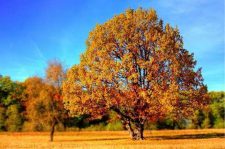If you don’t mind its ability to invade flower beds and cool season lawns Bermudagrass can make a nice lawn. But many people dislike this characteristic and the fact that the green season is short. Warm-season grasses, such as bermudagrass, zoysiagrass and buffalograss, green up later than cool-season grasses such as tall fescue and Kentucky bluegrass. They also go dormant earlier in the fall, which can make a lawn unattractive.
Bermuda that invades a cool-season lawn will be brown during much of the spring and fall while the tall fescue portion of the lawn is green. Bermuda is much more drought and heat resistant than cool-season grasses, so it will take over a cool-season lawn during the summer months if it is in full sun.
So, how do you control bermudagrass that has invaded a cool-season lawn? Recent research showed that glyphosate (Round-up, Kleen-up, Killzall, Kleeraway) is the best herbicide for the job. Glyphosate is a nonselective herbicide and will kill everything— including tall fescue or Kentucky bluegrass. Therefore, you will need to reseed treated areas. In our study, we applied a 2% solution of glyphosate on July 15 and again on August 15 on a bermudagrass plot that was more than 15 years old. More than one year later, we saw no regrowth. Glyphosate works best if bermuda is growing well. The better the bermudagrass is growing, the more herbicide is taken up and pushed into the roots. Water and fertilize if needed to get it going.
Spray about the middle of July (or when the bermuda is growing well). Use glyphosate (2% solution). Wait two weeks and scalp the lawn (mow as low as possible and remove clippings.) This will prevent dead grass from covering any bermuda that starts to recover. Wait another two weeks and spray again with glyphosate if there is any green. Wait two more weeks and reseed.




